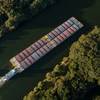Rotterdam Port to Achieve Dutch CO2 Target
Industry in Rotterdam is working on a series of projects with which a total of 20 to 25% of the Dutch CO2 reduction target for 2030 can be achieved. Virtually all of the projects require the government to play an active role.
"It’s precisely because so many transition projects are taking place in a small part of the Netherlands that custom solutions are needed for this area. The energy transition is a complex issue and many of the projects are interconnected. This calls for an integrated approach from the cluster and close cooperation between government, businesses and the Port Authority. If we complete all of our ongoing projects, we will achieve three times as much CO2 reduction here as we would need to if the emissions reduction target were to be divided equally across Dutch industry," concluded Allard Castelein, CEO of the Port of Rotterdam Authority.
The Port Authority is appealing to Minister Wiebes to adopt a cluster-oriented approach to the transition. Because of the concentration of industry in a small area, we can find solutions here that are not appropriate elsewhere. The interconnectedness of various transition projects means we have to coordinate them.
Although at project level, the government and business now know where to find each other, an integrated approach to the industry cluster on the part of the government is lacking.
The projects that industry, the Port Authority and various other partners are working on include the underground storage of CO2, the development of heat networks to make use of the residual heat from industry, the production of hydrogen, the landing of wind power from the North Sea, the development of additional infrastructure for hydrogen and electricity, various recycling projects and the increase in biofuel production.
The logistics sector is also running a number of projects, such as electric inland shipping and the greening of ocean shipping.
The Port Authority primarily sees the Cabinet’s proposal for the Climate Agreement as an opportunity for speeding up the energy transition; however, it also has misgivings about the document. In particular the proposed introduction of CO2 tax in 2021 is a matter of major concern.
Converting production processes in industry cannot be done within such a short time frame, and there is still almost none of the infrastructure required for the transport of CO2, hydrogen and residual heat. As a result, businesses are unable to keep up with the pace at which the additional tax is to be introduced.
The projects that contribute significantly towards the national climate objectives are part of the ‘Three steps towards sustainability’ approach developed within the context of the Climate Agreement. Step 1 focuses on efficiency, making use of residual heat, and storage of CO2 under the North Sea. Step 2 involves the development of a new energy system based on green electricity and hydrogen instead of on oil and natural gas. Step 3 focuses on the development of circular manufacturing processes.
The Port Authority’s ambition is to make the port a leader in the energy transition. Not only will this be good for the climate, but it may also benefit the business climate. For example because there will be a CO2 network, supply of green electricity and hydrogen, a residual heat network, etc.













